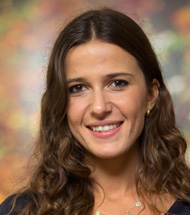An ICS PhD student will study the use of narratives as a method of social integration with young Maori from New Zealand
Sofía Brotóns will carry out a research stay thanks to a scholarship of the Caja Navarra Foundation.

PHOTO: Manuel Castells
Sofía Brotóns, doctoral candidate at project 'Public discourse' of the Institute for Culture and Society (ICS) of the University of Navarra, will carry out a research stay at the University of Otago (New Zealand) thanks to a scholarship of mobility for programs of study of research of doctorate, granted by the Caja Navarra Foundation. From September to December 2019, she will study methods of text analysis to learn how narratives can shape identity and thus promote inclusion.
In New Zealand you will accompany researcher Elaine Reese, from the Otago Psychology department , who is investigating how the way we use language shapes the way we see the world. Together with Reese, she will have the opportunity to collaborate on a pioneering research on Maori adolescents: "Growing up in New Zealand".
According to Brotóns, Maori youth are a socially excluded minority and one of their particularities is their language, which is very different from the Western languages we know and which, in a certain sense, can be considered more positive. "Both their language, as well as their special environment and culture make Maori society an invaluable case study when it comes to understanding how certain factors shape human identity," he says. Concepts such as the passage from adolescence to adulthood or even the very understanding of death in Maori culture are an example of how language shapes their way of seeing reality.
From New Zealand to Spain with positive languageBrotons wants to apply the analysis methodologies of the New Zealand researcher to her own data: 300 narratives, 300 interviews and 120 self-concept tests collected in two juvenile centers in Navarra. Ultimately written request, the young researcher wants to find a method that helps the social inclusion of young people in juvenile centers applicable to all of Spain.
"Adolescents at risk of exclusion are people who have lived through really traumatic experiences and often cannot put a name to them," she explains. Through writing, the young researcher seeks to improve self-awareness and future projection: "If we are able to put into words what happens to us, and in a positive way, we will overcome it more easily. And the Maori have a lot to teach us in this respect.
In addition, she assures that writing about feelings and problems financial aid to control them since one distances oneself from them. "These adolescents are so involved in their lives that they identify with their problems, 'I am that problem,' they think," the researcher laments. After working for half a year in juvenile centers, she draws very positive conclusions: "Writing about life and feelings increases self-knowledge, self-control and financial aid young people to see where they can go and makes them more optimistic".
